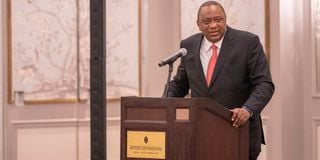Premium
Uhuru Kenyatta defends handshake with Raila Odinga at UN Security Council

President Uhuru Kenyatta gives his remarks when he witnessed the signing of a Kenya-US private sector trade agreement in New York, USA on October 12, 2021.
President Kenyatta has said the Handshake with opposition leader Raila Odinga was a “political innovation” that has helped Kenya accommodate ethnic diversity.
In an opening statement for a United Nations Security Council debate he was chairing in New York, yesterday, the President said the rapprochement with his political rival helped his government concentrate on governance without worrying about civil strife.
He argued that other countries could borrow a leaf to manage diversity in their populations.
“The handshake created a powerful surge of hope in Kenyans. Tempers cooled, we remembered that we were part of a Kenyan family and not defined by political rivalry,” the President said during the debate on diversity, state building and search for peace, part of Kenya’s thematic agenda on “peace building and sustainable peace” at the Council.
“It again became clear that we were fellow citizens, without regard to ethnicity or regional difference, and that we shared a common interest in peace,” he said.
While critics have termed the Handshake on March 8, 2019 a short-term deal by the political elite that has weakened oversight on government, the President argued that, it, in fact, let off the steam that would have made his administration troubled.
Political gesture
“The handshake was more than a political gesture. It was a political innovation that proposed to insert the safety, unity and prospering of Kenya at the core of our politics. We sought to build those safety rails into how the state is structured and works through a national conversation,” the President explained.
The Head of State further told Council members that his country had learnt a bitter lesson on ethnic politics and diversity. He said most of the world’s conflicts today have either been caused or fuelled by a feeling of marginalisation and divisions.
According to Kenya, the state remains the most important entity in building unity and multilateral stakeholders must work to ensure local solutions for conflicts, rather than trying to impose policies that worsen the grievances.
“The state must be built to be a leading protector of national unity and cohesion. This means it must embrace, as a core duty, the respect for difference,” he said.
“If the state is to demonstrate such a characteristic, the political leaders who lead it will need to emerge from a new politics of cohesion,” he added.
Archaic “tool box
Kenya had invited to the session President Paul Kagame of Rwanda, former South African President Thabo Mbeki and former Afghanistan Deputy Speaker of Parliament Fawzia Koofi.
President Kagame lampooned the international system for having an archaic “tool box” for handling international crises. He said the world must learn from his country’s own experience in ending the genocide against the Tutsi in 1994 as the world sat on its hands.
“Rwanda’s experience is that no matter how bad the situation appears, success is always an option,” he said.
President Kagame has said in the past that, inaction by the United Nations at the time may have contributed. At the Council’s session, he said Rwanda expects disputes to emerge in future, but has learnt from the past on how to deal with them.
UN Secretary-General António Guterres told the Council most of the world’s conflicts have continued because of short-term peace deals, often between elites.
“Without bringing all people along, any peace will be short-lived. Long-standing grievances don’t simply vanish after a peace agreement. They can easily flare up again,” the UN chief said.
For President Kenyatta though, addressing diversity will also mean an understanding by global players of how local problems routinely play into global crises including refugees, terrorism and illegal migrants.





